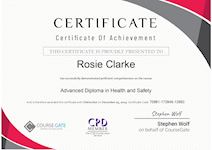Introduction to Astronomy
Exam Included . CPD Accredited Qualification . Lifetime access . Immediate Result
Course Gate
Summary
- Tutor is available to students
Overview
Astronomy deals with everything outside of our world, including stars, nebulae, planets, asteroids, moons, galaxies and much more. If you love astronomy or are simply hoping to find out more, our Introduction to Astronomy course will be perfect for you.
This Astronomy course will discuss the solar system, stars, galaxies and recent astronomical discoveries, as well as the possibility of life beyond the earth. You will also be given comprehensive lessons on black holes, dark matter and dark energy. Finally, you will learn about other issues regarding cosmology, the early universe, the theory of a multi-verse and the existence of life.
To make this Astronomy course more accessible for you, we have designed it for both part-time and full-time students. With content packed into bite-sized modules for your convenience, you can study at your own pace or become accredited within hours.
If you require support, our experienced tutors are always available to help you with the syllabus and answer all your queries through email.
This Astronomy course is the perfect course for anyone aspiring to or already working in astronomy, or for those who find the topic fascinating and wish to learn more.
Learning Objectives
The primary learning objectives of the Introduction to Astronomy are to:
- Give insights into the scientific study of the contents of the entire universe, known as Astronomy.
- Give a greater understanding and knowledge of astronomical history and significant events.
- Explain the aims and purpose of astronomy.
- Familiarise with different star formations in the night sky.
- Help you get up-to-date on the most recent astronomical discoveries.
- Provide advanced knowledge of reading the sky to understand more about the moon and planets
- Help you identify the incredible shooting stars.
- Develop your understanding of how the zodiac calendar and map interacts with the planets.
- Provide a greater understanding of the entire universe.
Course media
Description
Course syllabus
The Night Sky
- What is Astronomy?
- A Brief History of Astronomy
- Branches of Astronomy
- Astronomical Phenomena
- Basics of the Celestial Sphere
- Becoming an Amateur Sky Watcher
- How to Read The Night Sky
- Stargazing Equipment
The Moon and Planets
- Facts About the Moon
- Lunar Phases
- Observing the Moon
- The Planets of The Solar System
- Planetary Facts
- Identifying characteristics to observe planets
- Dwarf Planets
- Characteristics of Meteors, Comets, And Asteroid
- Observing Meteor Showers
- Haily’s Comet and Other Famous Cases
- Identifying “Shooting Stars” And Other Comets
- The Dangers of Asteroids
- How to View Evidence Of Asteroids In The Night Sky
Stars and the Zodiac
- Facts About Stars
- Star Formation
- Star Clusters and Supernova
- Identifying the constellations
- Astronomy vs. Astrology
Greater Understanding of the Universe
- Black Holes
- The Milky Way
- Galaxies
- The Big Bang
- Extrasolar life forms
Method of Assessment:
Upon completion of the course, you will be required to sit for an online multiple-choice quiz based assessment, which will determine whether you have passed the course (60% pass mark). The test will be marked immediately and results will be published instantly.
Certification
After successfully completing the course, you will be able to obtain the certificates. You can claim a PDF certificate by paying a little processing fee of £2. There is an additional fee to obtain a hardcopy certificate which is £9.
Who is this course for?
Introduction to Astronomy is suitable for anyone who wants to gain extensive knowledge, potential experience and professional skills in the related field.
Requirements
Our Introduction to Astronomy is open to all from all academic backgrounds and there is no specific requirements to attend this Astronomy course. This Astronomy course is compatible and accessible from any device including Windows, Mac, Android, iOS, Tablets etc.
Career path
This Astronomy course opens a new door for you to enter the relevant job market and also gives you the opportunity to acquire extensive knowledge along with the required skills to become successful. You will be able to add our qualification to your CV/resume which will help you to stand out in the competitive job industry.
Questions and answers
Hello is this course a life time access course?
Answer:Hello Wayde, Thanks for reaching out. You will get one-year access to the course after purchasing. If you fail to complete it within a year, you will extend your subscription and that won't cost you anything extra. Thanks.
This was helpful.
Reviews
Currently there are no reviews for this course. Be the first to leave a review.
Legal information
This course is advertised on reed.co.uk by the Course Provider, whose terms and conditions apply. Purchases are made directly from the Course Provider, and as such, content and materials are supplied by the Course Provider directly. Reed is acting as agent and not reseller in relation to this course. Reed's only responsibility is to facilitate your payment for the course. It is your responsibility to review and agree to the Course Provider's terms and conditions and satisfy yourself as to the suitability of the course you intend to purchase. Reed will not have any responsibility for the content of the course and/or associated materials.




